The Bookstore That Gave Up Five Decades of Principles To Be Woke
In the heart of Denver, Colorado, there’s a friendly neighborhood bookstore named Tattered Cover. Since its establishment in 1971 by founder Joyce Meskis, it has grown from one small shop with two employees to a thriving four-location operation. The store is well-liked by the Denver community and praised for its wide selection, cozy bookish atmosphere, and helpful employees—or at least it was, before the events of this past June.
This June, the bookstore found itself at the center of a raging controversy. Controversy itself was not unprecedented across Tattered Cover’s 50 years of business, but what was unprecedented was store leadership’s response. It began with a statement released on June 6th by Tattered Cover’s co-owners Len Vlahos and Kristen Gilligan, who took over from founder Joyce Meskis upon her retirement in 2017. In the wake of George Floyd’s death and widespread protests, pressure on companies and organizations to profess support for Black Lives Matter was at an all-time high, especially within the literary community. In response to this pressure, Vlahos and Gilligan shared a letter on Twitter explaining their position on Black Lives Matter and why they hadn’t expressed their stance earlier.
They begin the statement by expressing their support for Black Lives Matter, their solidarity with the black community, and their belief that systemic change must happen. They explain, however, that there are several reasons why they hadn’t voiced their position previously:
So why have we been quiet?
First, we think this is a time for voices other than ours to be heard. As a white-owned business, with a predominantly white staff, we feel this is a time for us to take a step back, to allow others to command more and greater attention.
More significant, though, is our nearly 50-year policy of not engaging in public debate. For Tattered Cover to shout this from the rooftops, to drape our spaces with banners proclaiming these simple and unalterable truths, would be anathema to a different principle that we also hold dear, and one that is central, we believe, to the role of an independent bookstore.
Our value to the community is to provide a place where access to ideas, and the free exchange of ideas, can happen in an uninhibited way. It’s not for us to determine which ideas in the pages on our shelves are valid and which are not. We leave that to you, our readers.
I find the first reason (staying out of the conversation because they’re a white-owned business) to be misguided deference at the altar of race-obsessed identitarianism. The second reason, however, is compelling: emphasizing the importance of the bookstore facilitating the free exchange of ideas. It’s clear that the principles of free speech and the open marketplace of ideas were part of Tattered Cover’s values for a long time. It’s no mystery where that philosophy came from: over the course of her career, Tattered Cover founder Joyce Meskis was a fierce advocate for intellectual freedom and free expression, and she won multiple prestigious awards for her contributions. In addition to founding Tattered Cover, she also founded the Colorado Freedom of Expression Foundation. She spoke often about her belief that defending free speech was one of the core values and duties of the bookstore:
By offering [a] diversity of materials and author events without prejudice, we are protecting the rights of each one of us. Without prejudice means that we do not let our own personal bias against an author’s work, or the bias of any individual or group, affect a decision as to whether we stock a book or host a signing. We have had pressure come in many forms, from financial boycott to the threat of physical harm as was the case with the publication of Salmon Rushdie’s book some years ago. Yet we cannot abrogate our responsibility to the First Amendment, which we believe to be the cornerstone of our democratic tradition and of our bookstore.
Meskis’ successors, Vlahos and Gilligan, initially seemed to have some interest in maintaining the founder’s ideals. In the letter, they reiterate the importance of the uninhibited exchange of ideas. They also positively reference several incidents where Tattered Cover put personal political views aside in order to facilitate the exchange of ideas, including hosting an event with Ted Nugent and refusing to affirm support for Occupy Denver despite threats and vandalism.
These choices indicate admirable adherence to the bookstore’s core value of facilitating free expression rather than picking sides. Vlahos and Gilligan assert that refusing to engage in controversial issues has lost them business rather than protecting it: “we do it for the principle.” There are few businesses left that are so dedicated to their core values—which is why it was so disheartening to see Tattered Cover, under Vlahos and Gilligan’s leadership, fling their principles out the window.
The bookstore’s long-held commitment to neutrality was already broken by the co-owners’ statement itself, which not only explicitly expressed support for a political movement but assumed it owed an explanation to people demanding why support had not been expressed earlier. The statement’s description of past neutrality was not given as a confident declaration of unbroken policy, but as an excuse offered to its critics: this is why we didn’t swear fealty to BLM before, but we’re doing it now, we promise. Gilligan and Vlahos go on to vow that they will “do better” by stocking more books by black authors, scheduling more events with black authors, and hiring more diverse employees.
Their initial statement was disappointing enough in its betrayal of the bookstore’s values, but everything was about to get much worse. Upon the release of the statement via Twitter, social-justice-oriented readers were infuriated. The tweet was “ratioed” with a thousand comments and as many quote-retweets decrying Tattered Cover’s discussion of their former policy of neutrality. Reply after reply echoed sentiments like “neutrality is siding with the oppressor,” accused the white owners of not caring about black lives, and declared a boycott. Blue-check authors and activists like Roxane Gay, Saira Rao, Maureen Johnson, and V.E. Schwab were sure to join in on the fun.
What’s painfully pointless about this blow-up is that the critics didn’t realize they had already won. By making a statement in support of Black Lives Matter, the co-owners had already sacrificed their neutrality. This was the case even before the controversial official statement was released: on June 2nd, several days prior, Tattered Cover had already tweeted support for BLM.
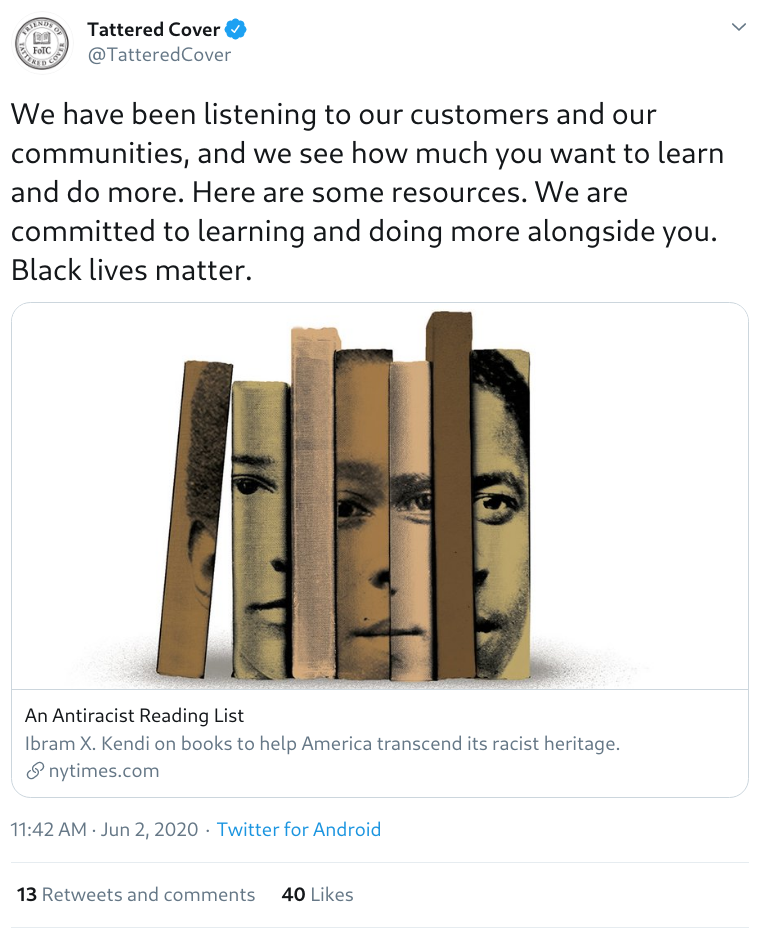
But because Gilligan and Vlahos referenced a history of neutrality as a justification for not speaking up earlier, a Twitter swarm descended.
The idea that neutrality or silence is complicity isn’t new, but I’m increasingly disgusted by it. People are allowed to stay out of petty politics, and I’m convinced that less political people actually lead happier lives. Not everyone needs to take a stance on everything, especially when the issues are complex and far from clear-cut. Police brutality is an important issue, but opposition to police brutality does not equate support for every ideal espoused by the Black Lives Matter movement. Given the statistically low number of police-caused deaths, it’s also not such a widespread atrocity that literally every person needs to be talking about it. Why is BLM a special case where everyone is required to make a statement in support? There are quite a lot of important issues out there. Has every BLM activist also made an individual statement condemning Uighur concentration camps in China? Because if not, by their own logic, they are complicit in racism, torture, and cultural genocide.
One commenter alleged that bookstores are “inherently political,” because selection of books is political. With all due respect, that is absolute horseshit. It’s fine if a bookstore does decide to take a politically biased approach to book selection, but that’s certainly not a requirement. I appreciate bookstores that simply carry popular books that customers buy, without filtering their selection through their personal political views. Just because certain Twitter activists have tied their existence to politics doesn’t mean everyone else needs to.
Regardless, Gilligan and Vlahos clearly panicked upon seeing the backlash. Two days later, on June 8th, the co-owners tweeted out a rather obsequious apology to the community:
We offer an unqualified and unequivocal apology for the statement we made on June 6. We apologize to our customers, our staff, our Friends of Tattered Cover, and to the entire community of readers, writers, and educators we serve. We are horrified at having violated your trust. We deserve your outrage and disappointment.
Tattered Cover will no longer stand by while human rights are being violated. To be silent is to be complicit, to be neutral in the face of injustice is an act of injustice itself.
They beg forgiveness for the “pain they’ve caused” and promise to back their words up with action. Unfortunately for them, “forgiveness” is not in an angry mob’s vocabulary.
The backlash continued to unfurl over the next few days. A local writer’s workshop that had formerly partnered with Tattered Cover hastened to cut ties and released their own statement of actions toward diversity. Several authors cancelled future events with the bookstore, and at least one employee quit.
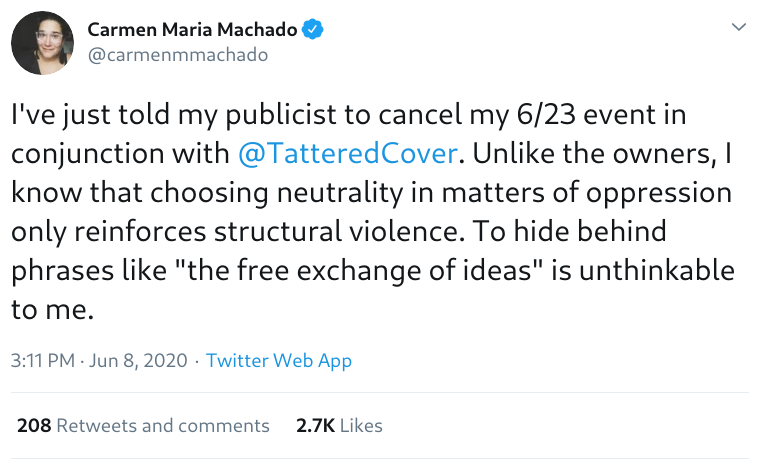
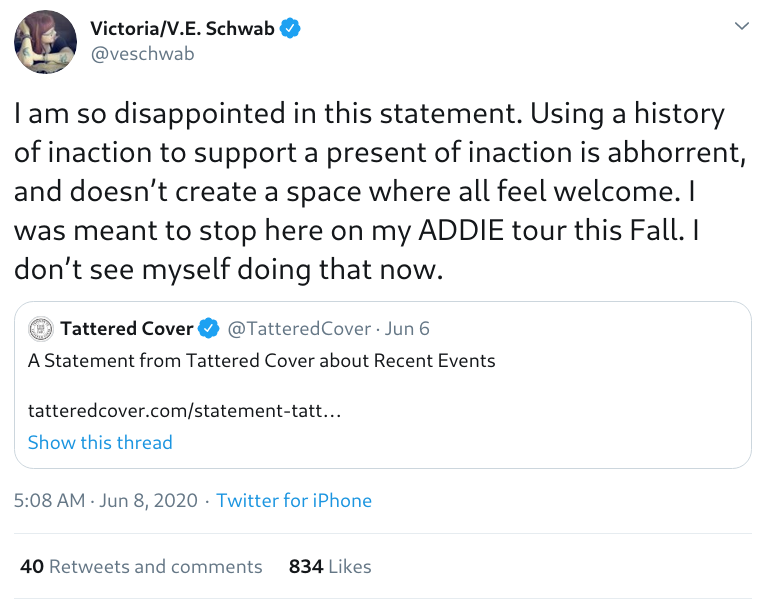
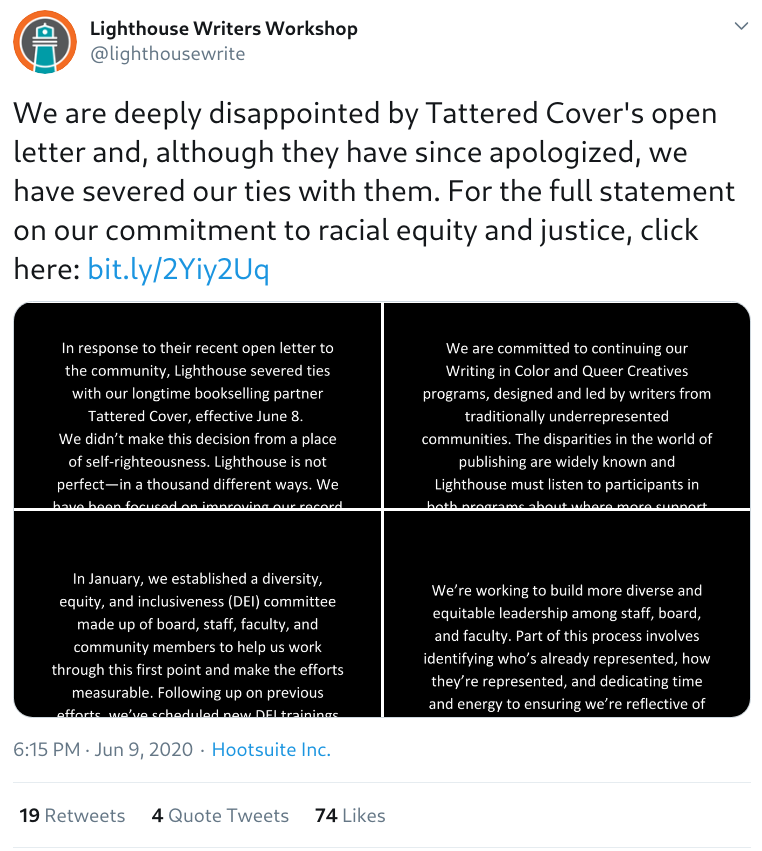
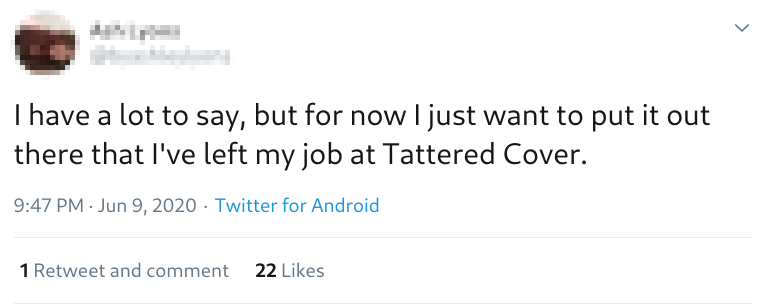
The former employee’s Twitter illustrates enthusiastic support for social justice ideology, and it would appear that she resigned because she believed that Tattered Cover’s previous prioritization of free expression was at odds with progressive causes. This begs the question: was she somehow unaware of Tattered Cover’s history and core operating philosophy while employed there? Either she was ignorant of the company’s values, which means she failed to do the most basic due diligence on her employer, or she was aware all along and only quit once the bookstore was under fire, under the guise of a grand moral statement. The job application for Tattered Cover literally states that it is “a retail business dedicated to the principle of free expression,” followed by an essay question on the applicant’s feelings about the bookstore’s values as as a whole.
A few days later, on June 11th, a local nonprofit called The Word joined the pile-on with an open letter addressed to Tattered Cover. The Word describes their mission as promoting diversity in publishing and providing a “sanctuary space” for underserved communities. The letter lectures Tattered Cover once again on how neutrality is complicity and what the role of an indie bookstore should be. I think the general level of reasoning is summed up best by this incredible pretzel-logic explaining why the bookstore needs to abandon their values of free expression: “Free expression is curbed when voices are muted by state-sanctioned genocide.”
State-sanctioned genocide. In reference to the treatment of black people in the United States. If you don’t know why that statement is batshit crazy, I don’t know what to tell you.
The letter lists ten demands for Tattered Cover. The typical penances include hiring more employees of color and stocking more diverse books. More creative demands include the elimination of fees for authors not associated with major publishing houses, the creation of disruption management policies that do not involve calling the police, and the donation of 10% of the bookstore’s paid advertising space to marginalized authors. The Word demanded a response and plan for execution within 30 days.
As a whole, the demands are unreasonable. Some are redundant—for better or worse, Gilligan and Vlahos had already promised in their first letter to focus more on diverse hiring and book selection. Some are ridiculous, like the policy of not calling police for disturbances. And several of The Word’s more radical demands, like the elimination of fees for all authors not associated with a major publisher, would drain revenue in an industry where margins are already dangerously slim. If you ask The Word’s Board Chair, however, the organization is “simply asking [Tattered Cover] to become better allies and create a safe space for the Black community in Denver and beyond.” Simply becoming better allies! They make it sound so easy.
A little over a week after The Word released their demands, Tattered Cover announced that they were starting a blog to track their progress on “doing better” with regards to diversity and inclusion. Throughout June and July, they updated the blog weekly with every action they were taking, including assembling an inclusivity task force, donating to BLM, adding BLM reading lists to their homepage, eliminating fees for indie authors, and hiring a DEI consulting firm.
They seemingly agreed to almost every demand, from the basic to the unreasonable. Ostensibly they felt guilt over their alleged complicity as well as fear of continued backlash, and they hoped to regain the good opinion of their critics. What the bookstore’s embattled co-owners failed to recognize, however, is that no matter how eagerly they acquiesce to demands, it will never be enough to satisfy an angry mob. No enraged activists, regardless of political stripes, will ever put down their pitchforks and go home simply because you tried to please them. Appeasement doesn’t calm them, it emboldens them to ask for more. Tattered Cover’s story is a picture-perfect example. Saying Black Lives Matter and committing to diversity and inclusion efforts wasn’t enough—they talked about a history of neutrality, which is complicity, and they should have supported BLM earlier. Fervent apologizing wasn’t enough—here are ten demands for action! Action wasn’t enough—they need to do more!
The truth is, the vast majority of Twitter scolds have no interest in redemption or progress. They prefer the fun part: finding something allegedly problematic, and then criticizing and boycotting and piling on before finding a new problematic target to attack. They don’t actually want to persuade anyone of their point of view, or to have a reasonable discussion about diversity. They want to shit on people and feel morally superior. The biggest indicator of this mentality is that precious few of them stick around for the aftermath. If you really want a person to change their opinion about something, you try to persuade them, offer them input, and make recommendations. You have a conversation and try to change hearts and minds. The Twitter cancel crew? They just drop a “I’m disappointed, never buying from you again,” and write the bookstore off as irredeemably bigoted. The original tweet for Tattered Cover’s controversial letter received a little under 2000 comments and quote-retweets. The tweet announcing their blog for “holding themselves accountable” and “becoming better allies,” which came a few weeks afterward, only had 4 likes, 5 comments, and 2 retweets. Because guess what? The cancellers do not give a flying fuck how hard you’re trying to please them. They’re just waiting for you to trip up again.
The comments on the blog tweet included two people expressing support who clearly hadn’t been part of the backlash, as well as three comments from disgruntled users who made it clear they still weren’t satisfied. One, from YA author and activist Kami Garcia, demanded that whomever had made the statement be fired. Evidently she didn’t read the letter closely (or at all), or she would have known that it was penned by the store’s co-owners themselves. Another two commenters declared that their boycott would continue because they felt the store’s efforts were not genuine. One of them noted that maybe she’d return in five years if appropriate progress was demonstrated.
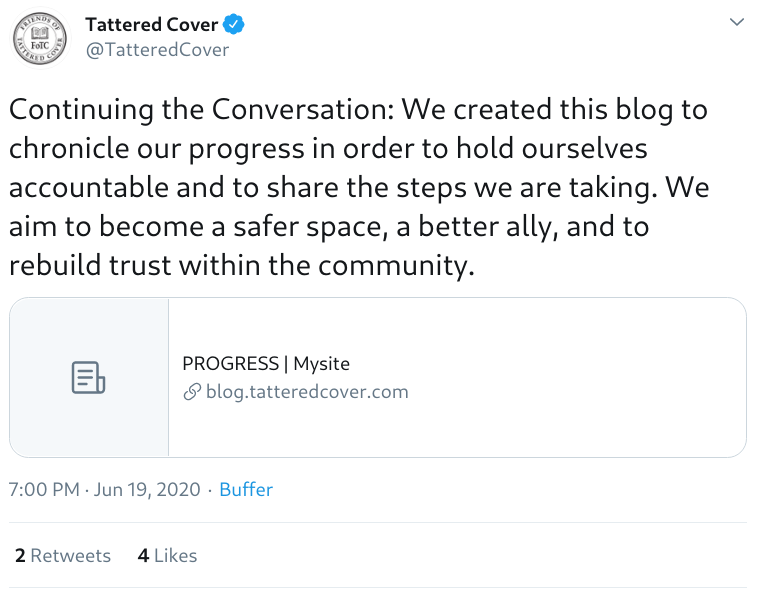
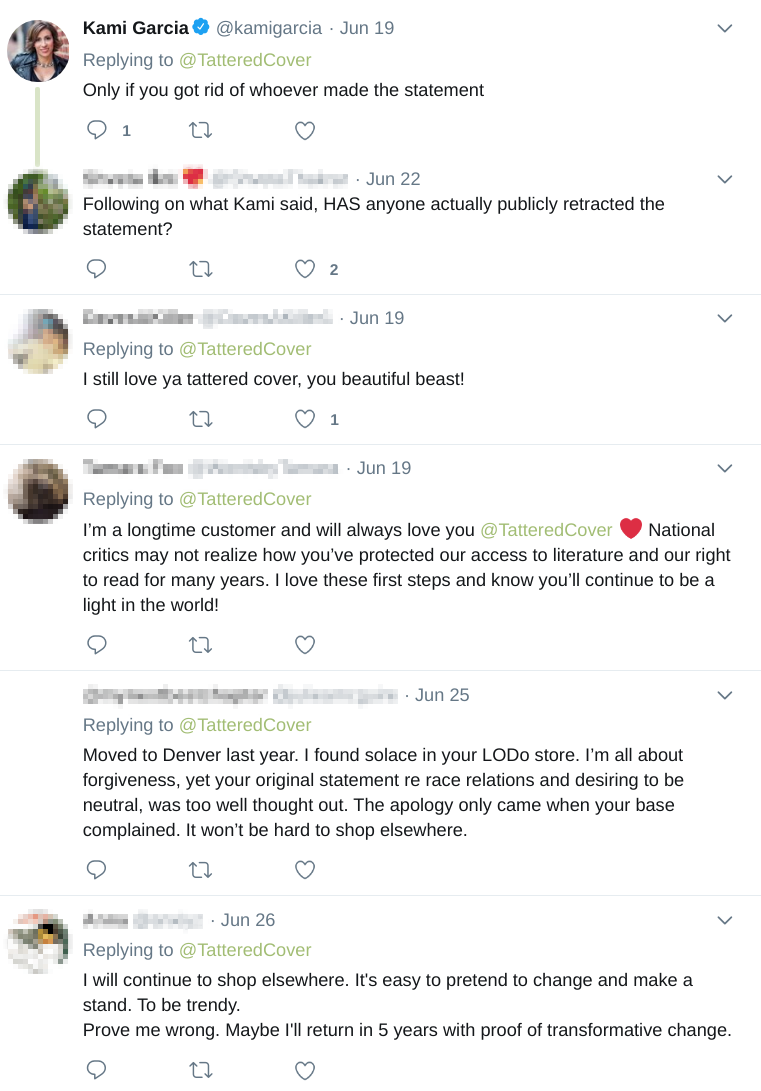
A tweet from late July announcing Tattered Cover’s long-awaited DEI Action Plan received similarly anemic engagement, with 7 likes, 3 comments, and 3 retweets. This plan was ostensibly what the critics had demanded, but upon its delivery, they showed little interest. Once again, they demonstrated no apparent regard for change or progress or redemption. Could it be that their crusade is not about justice at all? Maybe, just maybe, it’s more about the power of cancelling people they’ve branded as villains, so that they can convince themselves they’re heroes.
Meanwhile, think pieces like this one were published, titled “It’s Past Time for the Bookselling Industry to Reckon with Its Institutional Racism.” The author accuses Tattered Cover of “upholding a paternalistic and racist intellectual superiority” to “silence Black and POC communities.” The accusation of paternalism is particularly rich when her entire argument hinges on the idea that freedom of speech creates an “unsafe space” for people of color. Of course she must protect them, they cannot possibly survive “unsafe spaces” where disagreeable ideas are shared!
The bookstore industry has embraced a fanatical championing of free speech, which keeps their spaces unsafe for the Black community and other communities of color, and prevents stores from creating more inclusive working spaces for non-white booksellers. […] When bookstores champion “the free exchange of ideas” and let “the readers” decide what books are valuable, they uphold systemic racism.
Like the reaction to the Harper’s letter, this is a reminder that opposition to the the value of free speech is growing. The author of this piece is remarkably open about her opinion that supporting free speech and free expression means supporting racism, because it tolerates the existence of dissenting and objectionable ideas. Free speech is a core value of our country for a reason: regardless of which political movements are in power, it protects all speech to ensure that no view is unjustly suppressed. It benefits everyone, including social justice activists who are free to protest and voice their complaints because of the very principles they denounce as racist. The free marketplace of ideas makes us a better society. The increasing prevalence of anti-free-speech views on the left is a tragedy and a very, very bad sign.
On July 31st, there was a lukewarm attempt at re-cancelling (double-cancelling?) Tattered Cover. A Denver Post article about local bookstores coping with the pandemic mentioned Tattered Cover’s controversy and included the following assertion:
The store declined to comment on its [coronavirus] sales or survival tactics for this article unless an interview would omit discussion of their Black Lives Matter statement. The Denver Post declined.
An entertainment editor at the Post tweeted out the article and specifically called out Tattered Cover for their alleged refusal to talk unless the BLM statement was eschewed.
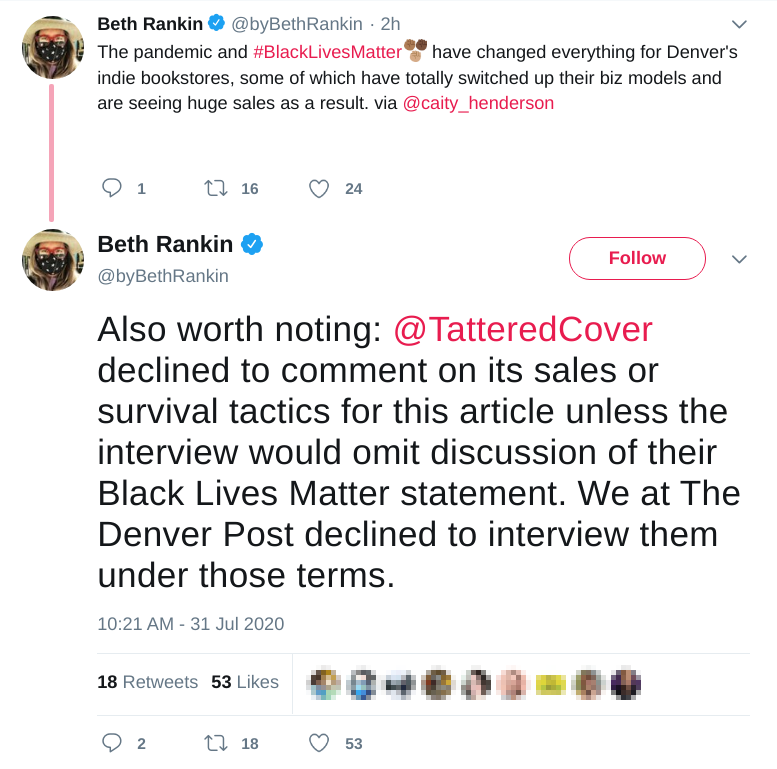
This picked up a moderate amount of Twitter traction (not all engagement may be reflected in the screenshot above because it’s an archived version of the tweet). Critics once again expressed their disgust and disappointment and vowed they would never shop at the bookstore again. It was not nearly as prominent an incident as the initial controversy, but it was another alleged black mark on a public reputation that was already, well, tattered.
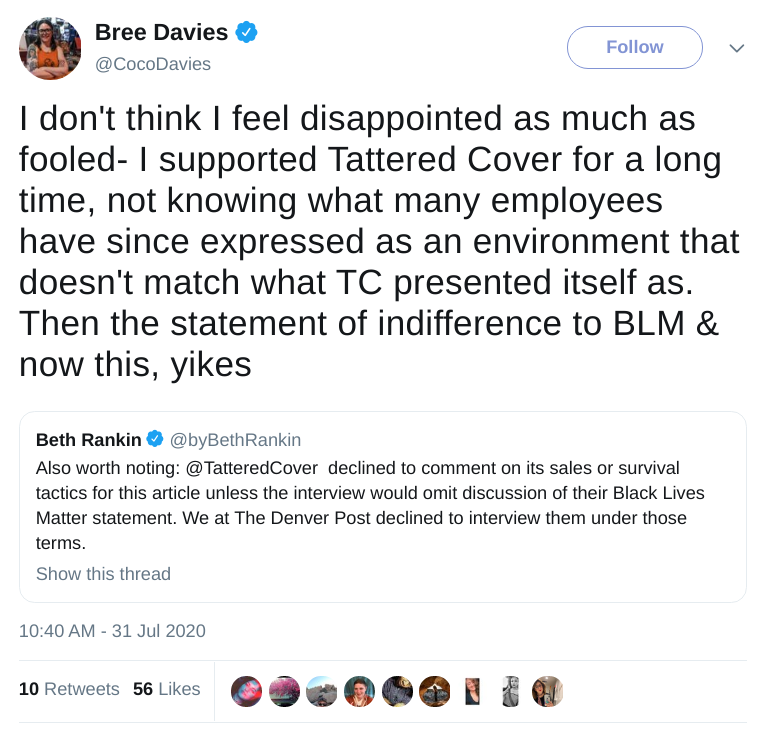
I saw those tweets and retweets as they happened. Funnily enough, I had a hard time finding them when I went back to research for this piece, and I discovered that the entertainment editor’s original tweet was deleted several weeks later. On that same day, August 17th, a correction was quietly added to the Post article:
Updated Aug. 17 at 4:28 p.m. The original version of this story incorrectly characterized the reason Tattered Cover did not comment. The reporter did not speak to Tattered Cover prior to publication and instead relied on second-hand information. Tattered Cover has not offered a reason for not responding to an interview inquiry for this story.
In the current version of the article, all mention of Tattered Cover other than this footnote has been removed. To sum this up, professional journalists at a major publication wrote and disseminated misinformation that launched a Twitter pile-on, and they only corrected it over two weeks later. I suppose I can give them credit for correcting it at all, but talk about a low bar for journalism.
I’m sure all the people who re-cancelled Tattered Cover over this definitely saw the correction and walked back their indictment immediately. Right?
The denunciation of Tattered Cover is clearly unjustified: dedication to the free exchange of ideas is admirable, not evil. The loss of that dedication is tragic. At the same time, it’s difficult for me to muster much sympathy for the bookstore owners’ current predicament. Gilligan and Vlahos chose their path when they decided to trade decades of deeply-held values in exchange for woke orthodoxy. I’ve never seen such eager groveling. And what have they gained by it? This episode hasn’t won them any new fans, either from free-speech advocates or the social justice crowd. Did they actually save themselves revenue? Undoubtedly not; they’ve had to engage a DEI consulting firm, which doesn’t come cheap, and have committed to sacrificing portions of revenue from advertising and author fees. There’s no telling what the exact numbers are, but I would make a strong bet that they would have saved money by putting their foot down, reiterating their support for free expression, and ignoring the backlash. How many actual customers and authors would have boycotted them over this? What percentage of actual customers even use Twitter? It’s hard to imagine that the cumulative value of losses sustained from maintaining neutrality would have been deeper cutting than the costs of acquiescing to a coalition that demands such significant financial evidence of commitment to their cause. And besides, didn’t Gilligan and Vlahos say that they “do it for the principle” despite financial losses? What happened to that?
In the final Diversity Equity Inclusion Action Plan, Len Vlahos includes a brief note on privacy and free speech:
While remaining true to our core principles of protecting reader privacy and ensuring that no Constitutionally protected content be banned, we will be critically conscious of our mindset and actions and through ongoing learning and growth, develop guiding principles that mirror beliefs grounded in equity, social justice, and anti-racism. We will continue to offer the broadest possible tapestry of voices on our shelves, and will be especially conscious of who we give a platform from which to speak at our events.
“While remaining true to our core principles.” Even now, he’s clinging to the illusion that he and his co-owner have not betrayed everything the bookstore stood for by allowing its inventory, events, advertising, finances, culture, and principles to be controlled by political activism. In the same breath he implies that certain speakers will not be platformed at their events. I suspect that Ted Nugent will not be visiting the store again.
I can’t help but wonder what Joyce Meskis thinks of this—the founder who once said “we will never proselytize nor will we ever censor any reading matter that you may seek,” and who relentlessly championed the free marketplace of ideas. Does she disapprove of her successors’ choices, or has she too changed her mind to believe that neutrality is oppression and certain ideas do not deserve to be discussed? In her days of running the bookstore, Meskis believed in combating bad ideas with speech, not with censorship. “The cure for a bad idea is not to censor it, because in so doing, it will never go away,” she said. “The cure is to speak about it, debate it, and gain strength in the wisdom that comes out of the discussion.” If Tattered Cover now acts at the whim of diversity consultants and political activists, that sort of wisdom and clarity will never be achieved there again.
I’d like to take a moment to consider what Tattered Cover’s co-owners have done here in choosing to abandon the principles that the bookstore was built on, the very soul of the business. The bookstore was committed to free expression and the free marketplace of ideas for almost 50 years. Protesters camping outside their store for Occupy Denver threatened employees, disrupted operations, and defaced the store for 3 and a half years, and store leadership managed to maintain their principles. But it was peer pressure and a Twitter pile-on that proved too much for them. A thousand tweets was all it took, and they collapsed into a heap of unequivocal subservience. It’s worth noting that the sheer moral pressure to conform to the demands of social justice coalitions is stronger than ever before; Tattered Cover is far from the first business to buckle, and it won’t be the last.
Nevertheless, they made their choice. They’ve thrown away the most foundational principles of their business and abased themselves for…absolutely nothing. They can fulfill every demand and follow every recommendation of their DEI consultant, and they’ll still never be forgiven or praised by the people who criticized them. Tattered Cover’s owners are now trapped on the endless treadmill of appeasement, while the cancel crew sits bored on the sidelines, waiting for them to trip and fall. When they do fall, they’ll be ripped apart all over again, and they’ll still seek the approbation of their worst bullies.
I’ll end with a few more wise words from Joyce Meskis:
We sincerely believe that censorship in any form, whether by individuals, special interest groups, or by government is seriously damaging to every citizen of this country. We believe that it is in the best interests of our democratic society that ideas of all kinds be allowed to flow freely to the individuals who seek them, regardless of what our own tastes might be. […] In fact, we maintain that it is our responsibility as booksellers to actively resist censorship that limits your right as our customers to make those choices for yourselves.
This is what Tattered Cover was, and could have been, and never will be again. And the literary world is worse off for it.
If you enjoy my work, please consider supporting me on Ko-fi.